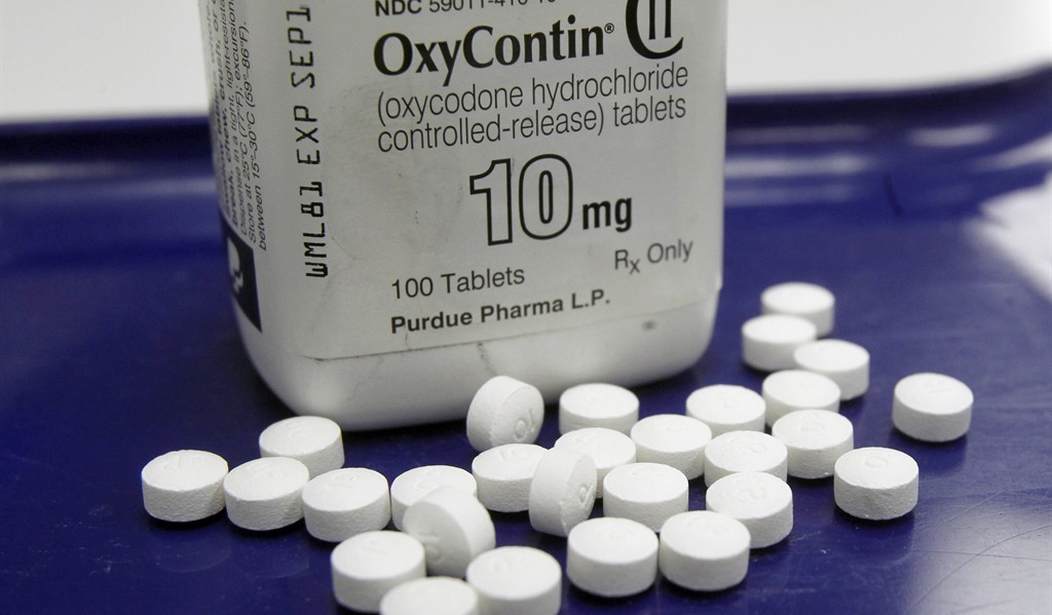Since 2014, state and local governments have filed thousands of lawsuits against pharmaceutical companies they blame for causing the "opioid crisis" by exaggerating the benefits and minimizing the risks of prescription pain medication. The theory underlying these cases is pretty straightforward: Drug manufacturers lied, and people died.
Two recent rulings -- one by a California judge, the other by the Oklahoma Supreme Court -- show how misleading this widely accepted narrative is. Both decisions recognize that undertreatment of pain is a real problem, and that bona fide patients rarely become addicted to prescription opioids, let alone die as a result.
Three California counties, joined by the city of Oakland, started the flood of litigation against opioid manufacturers seven years ago when they filed a complaint arguing that the companies they sued created a "public nuisance" by encouraging increased use of their products through a false or misleading marketing campaign. The four jurisdictions sought more than $50 billion in damages.
Following a bench trial that began on April 19 and wrapped up at the beginning of last month, Orange County Superior Court Judge Peter J. Wilson concluded that the plaintiffs had failed to prove any of their allegations. In a scathing 42-page ruling issued on Nov. 1, Wilson said the supposedly incriminating statements cited by the plaintiffs were neither false nor misleading.
As Nora Volkow, director of the National Institute on Drug Abuse, noted in a 2016 review of the evidence, "addiction occurs in only a small percentage of persons who are exposed to opioids -- even among those with preexisting vulnerabilities." The California plaintiffs nevertheless argued that it was false or misleading to say that "most" pain patients who take opioids do not show signs of addiction.
That statement is consistent even with the plaintiffs' claim that one in four patients become addicted, an estimate that Wilson concluded was not supported by the evidence. "The more reliable data," he said, "would suggest less than 5%, rather than 25%."
Recommended
Similarly, the plaintiffs portrayed the concept of "pseudoaddiction," which posits that doctors might mistakenly view patients desperate for pain relief as "drug-seeking" addicts, as nothing but a marketing ploy. But as Wilson noted, "this is a medically recognized term," and California law acknowledges the potential for such confusion.
The plaintiffs viewed any suggestion that an opioid "improves function" as deceptive. But Wilson thought it was "beyond debate" that opioids can improve function by controlling pain well enough for a patient to resume quotidian activities such as shopping, cooking and cleaning.
Wilson noted that the plaintiffs "made no effort to distinguish between medically appropriate and medically inappropriate prescriptions." Since both California and the federal government have determined that the benefits of medically appropriate opioid use outweigh its risks, he said, a rise in prescriptions by itself cannot constitute a "public nuisance."
A week later, the Oklahoma Supreme Court rejected similar claims against Johnson & Johnson, one of the defendants in the California case. The court said Cleveland County Judge Thad Balkman, who in a landmark 2019 ruling held the company liable for his state's opioid-related problems, "erred in extending the public nuisance statute to the manufacturing, marketing, and selling of prescription opioids."
Like Wilson, the justices emphasized the distinction between use and abuse. While "improper use of prescription opioids led to many of these (opioid-related) deaths," they said, "few deaths occurred when individuals used pharmaceutical opioids as prescribed."
The court noted that "opioids are currently a vital treatment option" for chronic pain, "a persistent and costly health condition" that "affects millions of Americans." It added that the Food and Drug Administration "has endorsed properly managed medical use of opioids (taken as prescribed) as safe, effective pain management, and rarely addictive."
That is not the impression left by the lawsuits that seek to blame drug companies for opioid-related deaths, which nowadays overwhelmingly involve illicit fentanyl. Patients should not have to suffer from unrelieved pain simply because the medication they need can be abused.
Jacob Sullum is a senior editor at Reason magazine. Follow him on Twitter: @JacobSullum.

























Join the conversation as a VIP Member